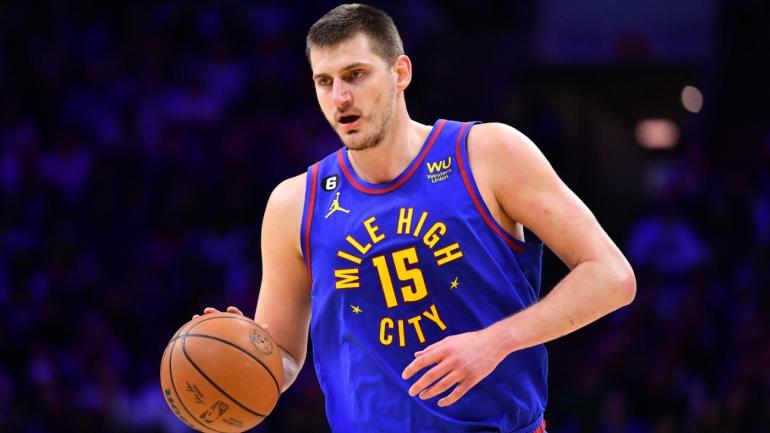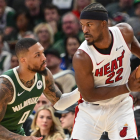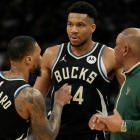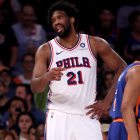
The NBA's MVP discussion is always a little contentious. That's the nature of debate aimed at separating the best of the best. But this season, the top candidates, even more than normal, are virtually inseparable.
Nikola Jokic. Joel Embiid. Giannis Antetokounmpo.
With a few weeks left to play -- and with the qualification that this is a close enough race to swing on a few games, notably the Philly-Denver matchup on March 27 and the Philly-Milwaukee game on April 2 -- that would be my personal finishing order. That said, I'm not a voter, and this isn't how I see the vote actually playing out. If I had to wager at bet, at this moment, I would put my money on Embiid.
Embiid's case is stout: Runner-up the last two years. The league's leading scorer and the anchor of a top-six defense. Currently in the middle of a 10-game scoring run that has only been matched twice this century. He has the Sixers battling for the No. 2 seed with the same number of wins as Jokic's Nuggets entering play on Tuesday.
Perhaps most influential is the fact that Antetokounmpo and Jokic have already won two MVPs. In Jokic's case, he's won two straight, and nobody has won three straight since Larry Bird in the mid-eighties. Voter fatigue is a real thing. In a race this close, it can be that simple. It feels like Embiid's time.
In the interest of keeping this simple, however, we would all be remiss to venture too far from the definition of this debate. Who is the most valuable player? Reasonable minds can and do disagree on the nuances of value, and what ultimately constitutes its definition, but on some fundamental level we should all be able to agree that what we're asking, in the end, is this: Which player has meant the most to whatever success his team has enjoyed this season?
This is not a best-player award.
This is a measure of value.
Which is to say, team context should matter. You'll often hear arguments suggesting a player shouldn't be punished for having a strong supporting cast, and while I agree with that to a degree, in a call this close, it becomes difficult, if not outright disingenuous, to argue that a player whose team falls completely off a cliff when he leaves the floor isn't inherently more valuable than a player whose team remains in the black even in his absence.
It's another way of asking: who is the least disposable? Through this prism, a much clearer picture, and thus a leading candidate, emerges. It's Jokic. It's always been Jokic.
Jokic's on-off numbers have of course been touted ad nauseam. I'm not providing anything new here. But this is part of the problem. People get tired of the same evidence the same way they get tired of the same answer.
So it bears repeating that when Jokic is on the floor, the Nuggets outscore opponents by 13.3 points per 100 possessions, per CTG. When he isn't on the floor, the Nuggets get outscored by 13.8 points per 100. Put another way, the Nuggets operate as the best team in the league, by a mile, with Jokic, and the worst team in the league, also by a mile, without him.
You can say these numbers are more a reflection of Denver's weak bench, but that's exactly what makes Jokic so valuable within the context of his circumstances. Denver cannot survive without him. The Bucks, on the other hand, remain a net-positive team without Giannis.
You might say the Sixers falling by 10.4 points per 100 possessions without Embiid is something until you do the Denver math and realize the Nuggets fall by over 27 points per 100 without Jokic, per CTG.
Around draft time, we love to invoke the terms floor and ceiling. Denver doesn't have a floor without Jokic. Remove him from the equation, and the Nuggets fall into a black hole. But he also qualifies as the biggest ceiling raiser.
As long as Jokic is on the floor, no matter who he's with, the Nuggets boast a higher net rating than Philly with Embiid and Harden playing together and Milwaukee with Antetokounmpo, Jrue Holiday and Brook Lopez on the floor.
Even if you take away Jokic's two best teammates, Aaron Gordon and Jamal Murray, the Nuggets, at +11.4 per 100, still qualify as a more statistically dominant team than the full-strength Bucks or Sixers as long as Jokic is playing.

CBS Sports HQ Newsletter
Your Ultimate Guide to Every Day in Sports
We bring sports news that matters to your inbox, to help you stay informed and get a winning edge.
Thanks for signing up!
Keep an eye on your inbox.
Sorry!
There was an error processing your subscription.
Again, this is where the word "statistically" is going to lose some people. They're tired of all the advanced numbers. Basketball isn't played on a spreadsheet, they'll say. Watch the games! To this, I would agree. If you watch the Nuggets with and without Jokic, you don't need a spreadsheet.
But if you don't watch the Nuggets, or you don't watch them as much as the Sixers and/or Bucks, then you are being willfully ignorant by dismissing, or even diminishing, these numbers. They are not lying. And they are also not, by the way, meant to disparage the considerable merits of Embiid or Antetokounmpo.
That's the part that always dirties these debates. In an effort to build up one case, we end up tearing the others down. All three of these guys are MVP-level players having MVP-worthy seasons. In fact, that's a statement that can be made about no fewer than 10 guys this season. Maybe more. The top-end talent pool has never been deeper.
Which is why these debates become so complicated. We're trying to split the finest of hairs. But anytime you're trying to figure out something complicated, the best approach to doing so, whenever possible, is to break things down into their simplest forms.
If we do that, Jokic will win. Again. He's the simplest answer. And in my experience, the simplest answer is usually the right one.






















